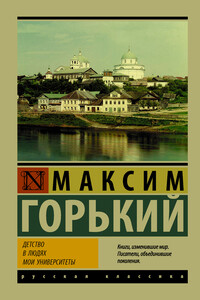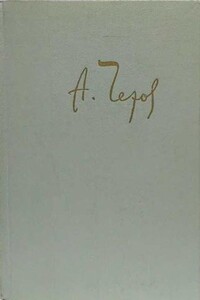| Sitting on the floor, I could see how the grave eyes with the two pale-blue flames moved across the pages of the book. Sometimes they were filled with tears, and the girl's voice trembled as she quickly uttered the unfamiliar words, running them into one another unintelligibly. | Сидя на полу, я вижу, как серьёзные глаза двумя голубыми огоньками двигаются по страницам книжки, иногда их овлажняет слеза, голос девочки дрожит, торопливо произнося незнакомые слова в непонятных соединениях. |
| However, I grasped some of these words, and tried to make them into verse, turning them about in all sorts of ways, which effectually prevented me from understanding what the book said. | Однако я хватаю эти слова и, стараясь уложить их в стихи, перевёртываю всячески, это уж окончательно мешает мне понять, о чём рассказывает книга. |
| On my knees slumbered the dog, which I had named "Wind," because he was rough and long, swift in running, and howled like the autumn wind down the chimney. | На коленях у меня дремлет собака, я зову её -Ветер, потому что она мохнатая, длинная, быстро бегает и ворчит, как осенний ветер в трубе. |
| "Are you listening?" the girl would ask. | - Ты слушаешь? - спрашивает девочка. |
| I nodded my head. | Я молча киваю головой. |
| The mixing up of the words excited me more and more, and my desire to arrange them as they would sound in a song, in which each word lives and shines like a star in the sky, became more insistent. | Сумятица слов всё более возбуждает меня, всё беспокойнее моё желание расставить их иначе, как они стоят в песнях, где каждое слово живёт и горит звездою в небе. |
| When it grew dark Ludmilla would let her pale hand fall on the book and ask: | Когда стало темно, Людмила, опустив побелевшую руку с книгой, спросила: |
| "Isn't it good? | - Хорошо ведь? |
| You will see." | Вот видишь... |
| After the first evening we often sat in the wash-house. | С этого вечера мы часто сиживали в предбаннике. |
| Ludmilla, to my joy, soon gave up reading | Людмила, к моему удовольствию, скоро отказалась читать |




